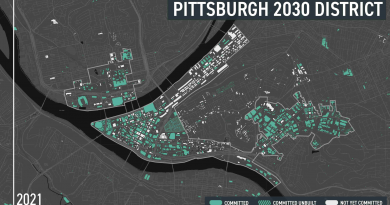TED Countdown Detroit: Sustainability’s Problem With Elitism and Respectability Politics
A spectre is haunting the sustainability movement. That spectre is, of course, the fact that the sustainability movement has become so mainstreamed that it’s now just been commodified, heavily branded, and co-opted by rich people and These McKinsey Types. (Sad trombone). Rich people co-opted a good idea and kinda ruined it? I know, I know– what else is new, right? This problem is hitting way too close to home this week as TED Countdown comes to Detroit to produce an invite-only, $4000-a-head event with a star-studded roster headlined by, among others, a dude who won the popular vote in a hotly contested national election nearly 23 years ago. Let’s talk about why an invite-only event for the rich is a bad look for sustainability, and how we can rethink this.
But first, as always, a bit of background! It all begins when the author of this article was a wee one (not that wee, but certainly not of voting age, nor of “ranting about sustainability on a blog” age).
The Origins of The New Climate Elitism
To many Democrats, the outcome of the 2000 presidential election was the most disappointing possible end to the near-decade of post-Cold War irrational exuberance. After all, Al Gore had won the popular vote— but lost the electoral college, which meant that electors (including elected representatives from heavily gerrymandered districts) chose the person who would hold the highest office in the land. (Don’t understand how this works? Don’t worry, no one else does, either). Did democracy even matter anymore? Was this born-again Christian Republican with a mock Texas accent in fact going to ruin everything?
I was a bit too young to follow the entirety of the political discourse in the 2000 election, but I remember a lot of chatter about the debates contrasting one guy (Gore) talking about all of the great things we can do to build a better society, and the other guy basically talking about giving money back to the richest few Americans. It was disappointing that so many people had bought into the latter, ignoring the possibilities of the former. Onescore and three years hence, the health of American democracy is in far worse shape than it was. But Al Gore has flown in on his private jet to motivate us to climate action.
When Al Gore dropped An Inconvenient Truth in 2006, it felt sort of like a coda that we had been waiting for– dude was on the move again, and he wasn’t about to let a little thing like the utter travesty of the 2000 election get him down! I confess that I watched this in a real, brick-and-mortar theater, and really enjoyed it. This was before Netflix, and back when I carried a laminated paper Blockbuster card in the polyester wallet I bought at PacSun. I drove my parents’ third-hand 1996 Volvo (with cigarette burns on the gear shift, for whatever reason) and listened to Neutral Milk Hotel on the ride there and thought I was hot stuff. It was a different time.
Reviews of the film at the time were largely positive. A.O. Scott in the Times called it “a well-made documentary, edited crisply enough to keep it from feeling like 90 minutes of C-Span and shaped to give Mr. Gore’s argument a real sense of drama.” Scott lamented that the fact that Al Gore was in the movie “will become fodder for the cynical, ideologically facile sniping that often passes for political discourse these days.” (Oh, if only we knew how bad it was going to get from there, sir). Critiques seemed more focused on labeling Gore an “alarmist,” suggesting– in what is, it seems, an age-old trope- that Democrats just want the government to spend more money on climate stuff so they don’t have to give rich people lavish tax subsidies!
Wrote Frederic and Mary Ann Brussat of the film upon its release:
“Gore argues that a country that abolished slavery, landed a man on the moon, and contributed to the reverse of the hole in the ozone layer must now join other nations in vigorously tackling the problem of global warming. He envisions a “Century of Renewal” with a combined emphasis on energy conservation, carbon capture technology, transportation, alternative energy sources, and engineering for efficiency that can alter the course of global devastation.”
If that isn’t boldly optimistic and boldly patriotic, I don’t know what is. I think often of my mother, who describes herself as fiercely patriotic, but who is also appalled at the lavish wealth of tech billionaires, the boundless perfidy of the Republican Party, and more– this kind of mentality imbued young me with an idea that we can be proud Americans but can also be proudly progressive, proudly inclusive, and can always be proudly working toward pluralistic and sustainable solutions for our country.
To some degree, An Inconvenient Truth seemed to embody that notion. It did generate broad recognition in the mainstream that wasn’t there before. Personally, my only major complaint- other than a bit of the alleged alarmism, certainly- was that I was disappointed that Davis Guggenheim had allowed so much of the film to just be shots of the former vice president staring pensively.
I was like, who cares, bro?
Anyway. Al Gore would go on to build the better part of a quarter billion dollars in personal wealth, with which he flies around the globe in a private jet to preach the gospel of decarbonization. Death, taxes, Shen Yun posters, and former politicians becoming obscenely wealthy. Again– thank you for your service, sir, you definitely would have been a great president from 2001-2009, but… you’re now kinda sorta part of the problem, I’m afraid.
Incremental Change Is Good, Even If We Need More. Does Incremental Good Excuse The Bad?
One thing An Inconvenient Truth definitely did, though, was catapult Gore– already a well-established and popular environmentalist figure in his own right- into the global spotlight. It also arguably highlighted the important transition of the sustainability movement into the mainstream. Things like solar power and concepts like “decarbonization” went from being fringe concepts in the 1980s and 1990s, evoking beads-and-sandals imagery and President Carter being ridiculed by conservatives for his suggestions to make America more independent from Middle Eastern oil, to being things discussed in board rooms with suits. A cynical interpretation– that this was just because people realized they could make money from it- would be mostly inaccurate.
Part of this was borne of a genuine recognition by the corporate sector that if we don’t address climate change, we may well be in deep doodoo in fairly short order. The question of whether that recognition translates to genuine action, however, is separate– similar to how I am always saying that climate change isn’t political– it’s the solutions to address it that are political.
BP did a masterful job of rebranding itself as “Beyond Petroleum” for the turn of the new millennium, and stuck with that story until the Deepwater Horizon spill forced, well, a lot of things. The BP example is worth mentioning because it highlights how corporations have co-opted the sustainability movement for branding and street cred, whether or not they want to do anything about it. BP now owns half of Lightsource, which is a major global developer of photovoltaics, and has actually, shockingly, stuck to its guns about reducing carbon emissions. Did they spill a lot of oil in the Gulf? Yes. Should their carbon footprint reduction excuse that? No. But we live in a complex world of complex systems and thoroughly (murkily) complex morality.
A cynical realist studying political economy might say that it doesn’t matter whether BP spilled oil in the Gulf, because someone was going to do it– in a society addicted to fossil fuels. A more gentle pragmatist might point out that, while it’s hard to make an omelette without breaking some eggs (or spilling some oil), we should at least recognize when good decisions are made, even when they follow a lot of bad decisions. Credit where credit is due. This is the pro-incrementalist view, and it’s one I usually ascribe to well-meaning liberals (like probably everyone attending or speaking at this event).
The Value of Mainstreaming?
Optimistically, the value of mainstreaming ideas like decarbonization and sustainability is that this indicates the potential for incremental course corrections to fix capitalism. Pessimistically, it doesn’t matter whether they’re mainstreamed, because capitalism, as she is imagined today by the 1%, is fundamentally unsustainable. I personally take a belief that is more in line with the optimist, recognizing the pessimist’s point, certainly, but also recognizing that we don’t remotely need to tolerate a system that allows the wealthiest people virtually unlimited control, power, and capital.
Shocker: Capitalism, with all of her fully functioning market economies and laissez-faire bullshit, will do just fine if you add a few additional percentage points to Mark Zuckertron’s tax bill, and use the proceeds to build a nationwide high-speed rail network, or a nationwide public broadband network, or to– bear with m here- ensure that race is no longer a proxy determinant of lifespan or healthcare access, or– the list goes on for as far as the imaginations of policy wonks, idealistic MBAs, activists, and the weirdos like me who are somewhere in between.
So, regardless of whether the optimist or the pessimist are correct in the above example, what does intentionality at a human level even matter?
I’m glad you asked, as this now brings us to the TED Countdown event taking place in Detroit this week as an example of when human beings forget that they’re human beings, and forget about that basic level of intentionality in favor of, well, pursuit of capital accumulation or lavishly-compensated speaking engagements. It is a great example of the sustainability movement’s problem with respectability politics and elitism. There is an odd catch-22 involved, in that many of my colleagues believe that it is necessary for us to produce these highly polished events that are palatable to the corporate elite, in order to be taken seriously.
I would have been blissfully unaware of the TED Countdown event, had it not been for the fact that a client-of-a-client is contributing to the production for what they referred to as “public art, except it’s not open to the peasantry for the first few days.”
As a city planner with an MBA who has spent my entire career watching from the outside as powerful people make bad decisions (and refuse to even collaborate or invite people like me to participate), I can tell you that we can accomplish all of this stuff without $4,000-a-head events, in a way that can be both palatable to the corporate sector and accessible to normal members of the peasantry (like me).
Here’s why this is just all kinds of bad.

First: Exclusivity Has No Place In Sustainability.
In general, billing any event, but especially one ostensibly aimed at making the world a better place as, first and foremost, an “invite-only” event, is just kinda sorta shitty, even before we get to the $4,000 price tag. We don’t need more reminders of exclusivity and the power of Them There One-Percenters, least of all in a city (Detroit) that has Been Through It. But these events appear to be enormously popular with both the city fathers (“oh, boy, this will put us on the map for people on the coasts, who generally only look at Michigan when we’re offering them an eight-figure corporate welfare package!”) and for the beard-stroking, intellectually masturbatory “thought leaders” that seem to show up to stroke their beards in events like this, nod, and say, “yes! we must engage with stakeholders! equity is vital!” They’re remarkably popular, too, for the “representation is important” types– a racially diverse group that believe that sustainability and racial equity will only be achieved if Black people are afforded the same opportunities to indulge in neocolonial systems of extraction and oppression as white people have been. (Is this postracialism?)
So, everyone loves it, right?
I’m not sure if the elitism is a TED-specific thing per se. I know a lot of white folk are really, really obsessed with some of the TED people, and even so many professional conversations I have will involve someone casually dropping, “oh, have you seen the TEDTalk of [This White Guy Who Used To Work For McKinsey]?” Yeah, probably not, Chad, or whoever you are, sorry– can we have a real conversation instead? Like, you know, maybe with some of your own original ideas? Provided you have them? Maybe, really, any ideas that just don’t come from rich people and instead come from normal people? Great. Thanks.
With a few exceptions (there are some good TED Talks!), this is the penultimate buzzkill for me, after that ever most glorious, highest, supreme buzzkill, “let me tell you about Landmark Forum!” I left off this list of buzzkills the threat of proselytization: I haven’t had to deal with people preaching the gospel in the workplace since I stopped collaborating with DWEJ and working with SEEL. But I digress.
Sustainability must mean “for all.” We can’t consume our way out of the climate crisis, nor can we have a climate resilient country that is only accessible if you have letters after your name, or an Ivy League degree. A lot of this is basic economic math, because the economy is driven by a combination of working-class labor and consumer spending of that working-class labor. I’ve written about this plenty, most recently in how the demise of the federal student loan forgiveness program is not unlikely to break the economy. But it’s ever more valuable when you consider the disproportionate effects of climate change on especially poorer and especially less white communities.
Another reason why we need to collectively shun dreck like this, though, relates to the Detroit scene itself.

Second: Wealth And Power Don’t Help Sustainability Discourse in Detroit.
In spite of the popular “comeback” narrative of Detroit, perhaps first expertly seeded into the collective consciousness of many Americans through Eminem’s 2011 Imported From Detroit video, Detroit is, by most estimates, a city that is barely hanging on. And, in spite of the continuing belief in Reaganomics– of everyone ranging from our beloved Mayor to our beloved Governor, who seem to think that investment in corporate welfare will lift all ships through “trickle-down economics”- the city continues to lose population as people move away for more prosperous places. Back in the day, the narrative was about white flight, looking at how especially upper middle class demographics were fleeing the city and depriving it of coveted tax base. Now, it’s Black flight– middle-class Black families leaving for inner-ring or farther-flung suburbs where costs aren’t any higher and the quality of life is much better.
Some of the farther-left advocates in Detroit might ask: Why do we need to grow? Why are you so obsessed with growth, you filthy capitalist? These are the same advocates saying in the above BP/Lightsource example that all corporations are evil, and we should bear neither individual nor collective responsibility for fixing the world’s problems, because corporations are evil and do bad things. It’s reductive and doesn’t get us where we need to go. To the first question, I’m “obsessed” with growth because without growth to a sustainable level of population density, we will never have the requisite resources to fund things like schools, mass transit, public health. The list goes on. (Note that I left public safety off that list, because especially in Michigan, we always have plenty of money for police and for highways).
How does growth relate to sustainability, then? Because it has been the wont of wealthy people in Detroit– for much of the past decade, certainly, to say nothing of the preceding century, which itself had plenty of great examples- to co-opt resources for their own benefit in a way that fails to serve the city beneficially at large.
Because without growth, we never get to the bare minimums of tax base, population density, and funding allocations, and so we’re going to always do the absolute bare minimum. The absolute bare minimum in Mike Duggan’s case involves a building department that doesn’t actually enforce building code (it’s the IECC, by the way, and the lack of enforcement just means that Detroit families will be paying way more money on their already-sky-high energy bills for decades to come). Never mind that the mayor himself has orchestrated a number of environmentally blunders, not the least of which include the bungled Chrysler plant expansion on the Eastside (and accompanying conversion of a good chunk of the Conner’s Creek area into floodable surface parking lots for Jeeps). The relatively unregulated demolition of the incinerator, in which the mayor seemed woefully unaware of the respiratory hazards posed by concrete dust?
The list goes on.
But in Detroit, we take what we can get. Because we have so little, and we don’t know that a better world is possible. But we’ve certainly been conditioned to believe that the answers will come from us trusting in rich people. Just a little more!
A Gathering Of The Elite Doesn’t Move The Needle, Because Reaganomics Isn’t Real.
Finally, never mind that Ford’s new billion-dollar Michigan Central project is hardly embracing the cutting edge of building technology (as far as I can tell with a thermal camera, a pair of eyes, and feeling the frigid breeze of air conditioning escaping from some doors whose architects clearly missed what ASHRAE has been thinking about over the past 30 years), to say nothing of sustainable site design, which is still deep into the old school mindset of concrete, steel, and mastery over nature. Because an engineer said so. Oh, and some Home Depot Garden Center level of landscaping that pays no mind to native ecology or rainwater management. (DPW was in charge of much of this and it frankly looks awful).
In other words, the crown jewels of the city’s revitalization don’t say a damn thing about sustainability. That’s partially on Mike Duggan, sure. But it’s frankly hard to fault a guy from a midcentury strip mall suburb, whose last job was running a for-profit hospital, for not caring enough about the cutting edge of energy and sustainability. It’s Michigan, damnit! We drive trucks, and we dump the hexavalent chromium into the waterway, because that’s what our daddy did before us, and that’s what our kids will do after us, when we retire with a full UAW pension at 43! A local nonprofit colleague once called this the “assembly line mentality” that, he claimed, hindered the growth of progressive policy direction.
It’s also an endemic problem in a state that cares more about marketing conservation than it does about actually doing it. It is not part of the culture here. And no one in state policy world wants to offend the manufacturers that are, it seems, all too eager to flee for the Sunbelt and the South, where there are no unions, land is cheap, and environmental regulation is, well, negotiable.
That’s all a very long way of saying that creating some elite forum for the rich and the famous to hobnob with one another doesn’t really do anything to move the discourse in Detroit, because it’s based on the erroneous but still wildly popular notion that trickle-down Reaganomics will result in some rising tide for all of us. Is there a gestural effort to enlist some Actual Detroiters in the conversation? Uh, well… not really, no, as it turns out, except for a few perennial headliners like Tunde Olaniran or Anika Goss. Detroit puts up the same people in the same events to represent it on questions of sustainability, while all the while continuing to rely on this worship of wealth– ranging from the governor’s handpicked panel of old millionaires aimed at stopping population loss, to the emphasis on the value of corporate welfare and the utter deference to rich people like Al Gore or his McKinsey ilk instead of, say, community activists in Core City or Brightmoor who have been talking about sustainability for half a century.
The primary reason, though, that this kind of event doesn’t help, is because the rich and the famous are, by and large, the primary beneficiaries of austerity, deregulation, and corporate welfare (obviously in this last case). And this brings us to our last point.

Third: Equitable Decarbonization Can’t Come From These McKinsey Types.
I am here to tell you that sustainability must mean sustainability for all, or it isn’t sustainable at all. That triple bottom line? Often truncated to a double bottom line. Profit, and planet only when operational improvements can improve the bottom line. People? Fuck ’em.
There is a popular, but erroneous, mentality in sustainability, and that’s the notion that we can fix climate change simply by shifting how we consume, rather than by consuming less. This is popular for the lay person because it suggests that everything can be solved by simple decisions between “A” and “B” product, and no effort or sacrifice is required. For obvious reasons, it’s popular among the people trying to sell you solutions.
I am here to be the bearer of not-so-breaking bad news that we cannot continue any semblance of business as usual if we’re going to solve the climate crisis. I’ve oft weathered copious criticism from my colleagues for suggesting what they call “controversial” and “combative” positions (saying things like “we can’t decarbonize transportation with giant SUVs,” or, “perhaps agencies run by climate denialists shouldn’t be wasting billions of taxpayer dollars to commit climate arson”). The people who write about “mobility but we just mean cars” are the same people who write about “sustainability but we just mean ESG box-checking.” For the most nefarious actors, it’s more like, “sustainability but it’s actually just fossil fuels.”
Bringing a Detroit-specific example directly relevant to the question of sustainability as a tool for racial justice, these are the exact same people who want to talk about elevating Black voices, but the closest they get to building meaningful relationships with a Black Rust Belt community struggling with legacies of institutional oppression, codified and latent racism, and intergenerational poverty, is that they have a LinkedIn connection with an Ivy League legacy technocrat and second-generation West African immigrant who moved to their Rust Belt city for a $150,000 salary after working for a Fortune 100 company in a more prosperous city.
And this is all, mind you, taking place among people who probably all vote blue!
Are Conservatives Right About Us?
(TLDR: No, but they’re not 100% wrong).
The conservative critique of the sustainability movement is largely obsessed with Globalist Elite Boogeymen. This obsession obfuscates the point about consumption for various reasons. First, conservatives always want to claim that any efforts to reduce energy waste, mitigate greenhouse gases, or, say, reduce the amount of hexavalent chromium that gets dumped into waterways in any given year, is some sort of conspiracy of a shadowy cabal of Global Elites. (Of Jews, they mean, a terminology that has been well-rooted in anti-semitism, going back to 1920s Nazi rhetoric, and encapsulated perfectly in this post on a social media platform that has become largely a cesspool of right-wing bots and trolls since That Guy took over). By and large, this dismissal– whether tempered or not by the right-wing’s cozy waltz with bigotry and antisemitism- tends to derail productive dialogue on the subject, and that’s why I’ve tried to write a lot about how we can find opportunities for bipartisan or nonpartisan policy and projects that emphasize shared objectives.
But even if we give a nod to the conservatives here as stopped clocks, we still have to suss out what the actual objective of these so-called shadowy global elites supposedly is. It turns out that it’s pretty basic, and has absolutely nothing to do with George Soros, the Jews, or Our Space Laser (the American Jewish History museum found this last one so funny that they turned it into a mug). There just happen to be a ton of very wealthy, very powerful people that have a very strong vested interest in you not reducing how much you consume, and so they’re going to do whatever they can to package, brand, and market sustainability, regardless of what the material value of the discussion actually is. Never mind that this class of super-elites– whether Al Gore or Sheldon Adelson- was largely created from the past 40 years of disastrous tax policy that has eroded the working class while allowing the spectacular aggrandizement of the ruling class.
A cursory look at the more than 50 attendees of the TED Countdown event in Detroit suggests that around half of them are graduates of what I call the Ivy League Extended Universe (Ivy League schools plus Stanford, Duke, Loxbridge, and the Universities of Michigan Ann Arbor and California Berkeley, with admittance into this list determined by a balance of rankings, how assholish their alumni are in gatekeeping, and, of course, some completely arbitrary determinations on my part).
At least one is a McKinsey alum, touted on her bio– but it’s okay, she’s doing God’s work now, so we can ignore that her former employer may well have helped orchestrate the assassination of journalist Jamal Khashoggi, or the opioid epidemic that continues to kill several thousand Americans each day. There are a few artists and Sustainable Thought Leaders. Whatever that means.
Diversity? Why, yes! We have Black women, Black men, Asian men and women, Latinos and Latinas, white women, and white men. And most of them are part of the Ivy League Extended Universe! That’s it, folks, we’ve solved climate change!
Beyond the Ivy League Extended Universe
It’s possible, of course, that some good will come out of this. It’s remotely possible, I suppose, that someone will read this and think, “hey, the dude makes some good points! Maybe we should bring more people like him into the dialogue!” (Freeze-frame, narrator voice: this was not a likely outcome).
Even more loftily, I hope they will say, “hey, this guy has an MBA and a degree from one of the top schools he seems to be dissing here– maybe we should really listen to his point and actually start investing in real human beings and elevating their voices instead of just technocrats who happen to sound an awful lot like him!”– and just write me off altogether in favor of pursuing a more aggressively pluralistic stakeholder engagement strategy, shall I say.
More likely, though, than either of these, is me receiving two types of responses after I write this. The first goes something like a comment I get after every conference session Q&A: Hey, thanks for asking the tough questions that I was too afraid to ask! The second type of response probably comes from someone who makes a lot of money and could have afforded to come to this event. They will write to me about how of course your career has floundered, and you are relegated to a meager existence subsisting off Patreon subscriptions! You write articles saying that we can’t solve the climate crisis by kowtowing to billionaires! You know better!
It’s true– I should know better.
But I don’t.
Because I, wild though it may be, happen to have a lot of faith in people.
And I think we can solve the climate crisis.
We just at some point must stop relying on the billionaires and the global elite to tell us how to do it, and must instead rely on each other.
Radical, I know. But it just might work.
(This article was edited for style and to correct some block formatting issues).




